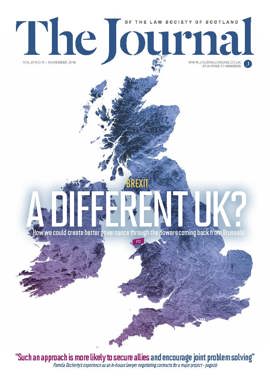Brexit: leaving European judicial space

One important issue in Brexit for all those dealing with cross-border cases is the question of jurisdiction and the recognition and enforcement of judgments. The Brussels Regulations set out the relevant rules and procedures within the EU in civil and commercial matters (Brussels I), and family law (Brussels II-bis).
The Regulations have created a so-called European judicial space, where along with the other free movements, judgments move freely. The ultimate aim is to ensure that judgments by a court in one member state are almost as easily recognised and enforced throughout the EU as domestic judgments, without the need for lengthy judicial or administrative procedures. To facilitate this, they also provide for rules of jurisdiction, which determine the most appropriate court to hear the case.
Even if not part of the internal market legislation, the Regulations complement the internal market freedoms. It would be difficult to think that, for example, goods can be traded freely, without being able to rely on effective settlement mechanisms where trade disputes arise; or that families can move across borders without a mechanism to recognise the family ties or changes to them.
What, then, can be done to ensure continued recognition and enforcement of judgments after the UK stops being an EU member?
What sort of agreement?
There is no automatic application of Brussels I and II-bis, even if the UK were to keep the legal frameworks unilaterally. Recognition and enforcement of judgments needs always to be agreed between states, or in this case, the UK and the EU.
In civil and commercial matters, there are no straightforward alternatives to Brussels I. The first option could be to have an agreement between the UK and the EU, similar to the Danish one on the application of Brussels I in Denmark. Although Denmark is an EU member state, it does not fully participate in EU judicial cooperation measures. It applies the Regulation under international law, not EU law, and the Court of Justice has no jurisdiction.
This option is not unilaterally available to the UK without a further agreement with the other EU states, but it could provide a possible model for a new UK-EU relationship, which could also include provisions on trade access.
The other main alternative is the Lugano Convention on jurisdiction and recognition and enforcement of judgments in civil and commercial matters. This creates a parallel regime to Brussels I which is applied between the EU and EFTA states. The UK could join in this Convention on the invitation of one of the parties. However, as an international Convention, it will need to be ratified by all the parties concerned. Until that can be achieved, some transitional regime may prove necessary so that there continues to be a framework in place.
The Hague alternative
Otherwise, at international level, there are the Conventions agreed at the Hague Conference on Private International Law. In civil and commercial matters, this includes the Hague Choice of Court Agreements Convention, which has been ratified by Mexico, Singapore and the EU. Speedy entry into this Convention would ensure the continued recognition and enforcement of judgments where there is an exclusive choice of court agreement between the parties.
The Hague Conference is aiming to propose another worldwide Convention on recognition and enforcement of judgments in 2017. It is not quite as wide in its application as Brussels I, which applies to all civil and commercial judgments, but it may become important for global recognition and enforcement, provided it is agreed and ratified by Hague Conference members.
In family law the Hague Conventions provide rules very similar to those of Brussels II-bis. Furthermore, the UK is already separately a party to the Hague Conventions, as are all EU member states, therefore there is no need to wait for ratifications to be completed. However, cooperation in family law at EU level goes far beyond purely mechanical ways of determining jurisdiction and recognising and enforcing judgments. The basis for the Brussels II-bis rules is trust between courts and national authorities in the interest of the parties, especially children, the recent abolition of exequatur being a good example. The EU instruments perform better, providing speedier and more efficient processes.
In addition, judicial cooperation in civil matters includes the EU instruments facilitating settlement of consumer disputes, such as the alternative dispute resolution framework, expedited procedures to help recover small claims, or the European insolvency law framework. Some of these have been adopted only very recently and it is not possible to state how important they are in practice. However, what all this points to is that there are consequences for practitioners which arise from withdrawing from the EU judicial space, which the Brussels Office is analysing.
In this spirit the Brussels Office would also welcome contact from practitioners, to share any pertinent views which could help us provide evidence about the issues facing the profession at this time.
In this issue
- Insider lists: the new must-do
- Pensions valuation and the “relevant date”
- Data: blurring the lines between privacy and risk?
- IT: the proficiency and the gaps
- Reading for pleasure
- Opinion: Peter Boyd
- Book reviews
- Profile
- President's column
- The Keeper steps in
- People on the move
- Beyond Yes and No: Britain after Brexit
- Brexit: leaving European judicial space
- Timed out? Alternative financial claims by cohabitants
- The end of the cash ISA?
- We need to talk about Beatrice
- Global players
- Digital: the dark side
- Cautionary tale
- Married to the land? – appealed
- Pregnancy: the unequal burden
- Privacy: strictures and safeguards
- Trapped employers – relief any time soon?
- Scottish Solicitors' Discipline Tribunal
- Convenient, but necessary?
- Is there a lawyer in the house?
- From the Brussels Office
- Law reform roundup
- Master Policy: the new team moves in
- The "buzz" of mediation
- Plan into action
- Sorry: the hardest word, made easier
- Ask Ash
- Appraising: what's your score?
- Paralegal pointers






